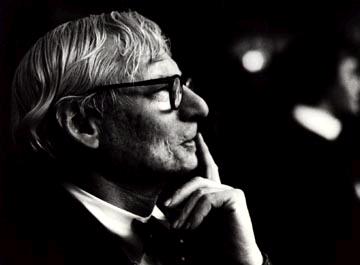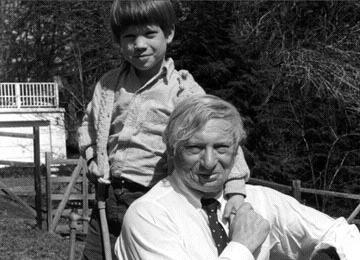My Architect


In 1974, architect Louis I. Kahn died in Penn Station of a heart attack. The obituaries said he was survived by a wife and daughter, but soon, everybody would discover that he had two other families. Nathaniel Kahn (My Father's Garden) was his only son, and a member of one of those 'hidden' families. All his life he wondered about his father, and the strange dichotomy between the world-famous and influential architect, and the man who fathered children between three different women. Nathaniel grew up with a huge empty space in his life, and many questions for his father Louis, who died when he was eleven. My Architect is Nathaniel's way of trying to discover more about his father, by interviewing Louis' relatives and friends, and learning more about the buildings he made. Perhaps, he thinks, he will reach some sort of emotional closure.
The result is an uneven documentary. The film is not about Louis Kahn, but about Nathaniel Kahn's search for his father, and although the intentions are altruistic, there is sometimes a self-serving air about the film. Remember, the title of the documentary is "My" Architect. What exactly is the point of watching Nathaniel rollerblade across the Salk Institute? Or watching him try to (unsuccessfully) put on a yarmulke? Nathaniel is not a great interviewer, and sometimes allows his subjects to ramble. The worst aspect of his interviewing, and of the editing, is his tendency to allow long awkward silences. Sometimes they are artificial, as one can see the subjects talking in the background, but there is no noise.
The subject matter makes up for Nathaniel's deficiencies as a director. Louis Kahn became famous near the end of his life, and brought back a sense of majesty and timelessness to his work. He liked working with simple geometric shapes, and many of his buildings were purposefully reminiscent of ancient castles. My Architect visits many of his works, from the previously mentioned Salk Institute in San Diego, to the Yale Art Gallery, the Richards Medical Towers, and the stunning Exeter Library and the Capital Complex in Dhaka, Bangladesh. There is something spiritual about Kahn's works, and to his credit, Nathaniel does do justice to his father's work. Nathaniel arranges the documentary not chronologically, but topically, and seems to bounce around without much focus until about the midway point, when everything betweens to tighten.
Then, My Architect takes a more personal turn. Through various interviews (including brief ones with I.M. Pei and Frankd Gehry), Nathaniel tries to discover Louis Kahn the man, as opposed to Louis Kahn the architect. He married Esther and bore Sue Ann. Later, he had an affair with Anne Tyng, a coworker, and bore Alexandra. Even later, he had an affair with Nathaniel's mother, Harriet Pattison. In actuality, Louis was married to his work. Still, he managed to find time for all three families. The most emotional interviews are the ones with Tyng, Pattison, and a reunion of the Kahn children. Here, one can see the frustration and anger that his family felt at Louis, yet there is also a deep love. Kahn was described as a brilliant and charismatic man, and this was undoubtedly one of the reasons that Pattison and Tyng were able to live through this strange contradiction. As Nathaniel mentions, these women were single mothers at a time when being a single mother was a scandal. At the end of My Architect, it seems like Nathaniel has achieved some sense of closure, and, despite the sometimes amateurish feel of the film, the viewer has a clearer, yet not full picture of Louis Kahn.